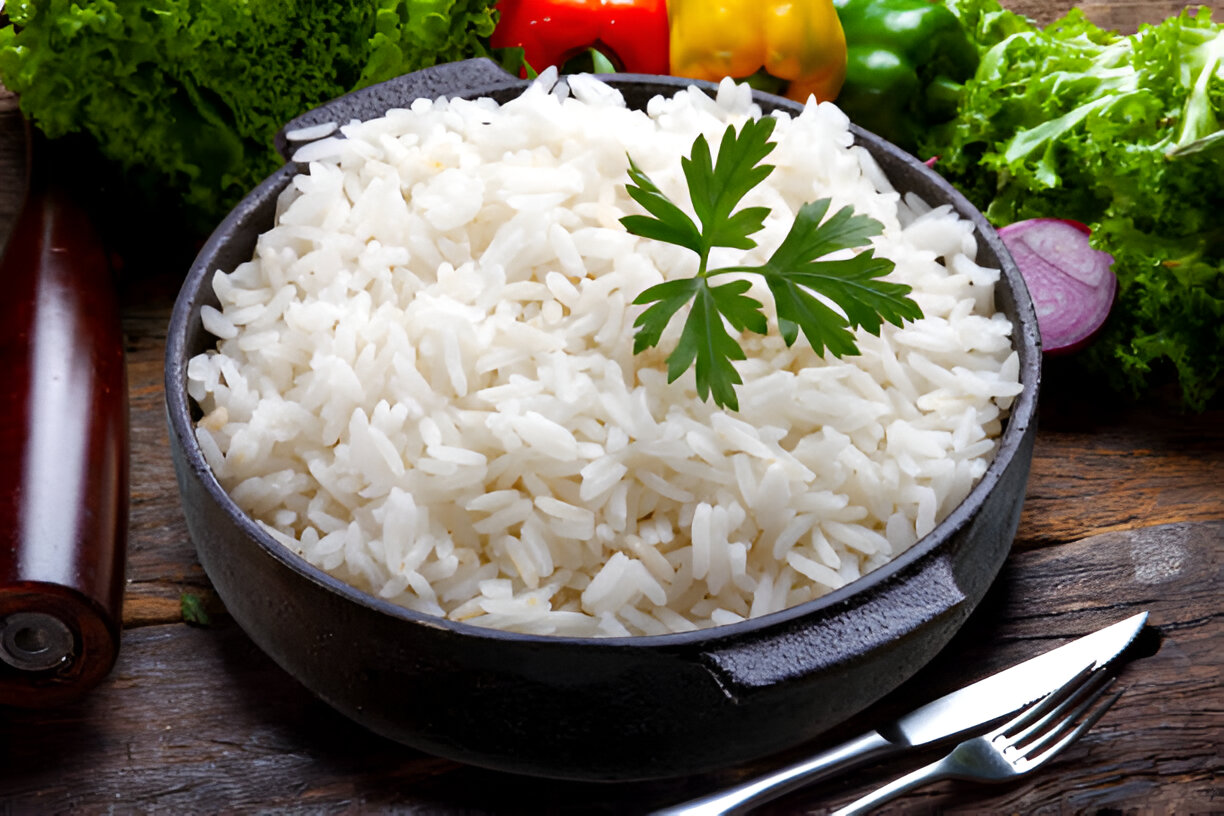Basmati rice is celebrated for its long grains, aromatic fragrance, and impressive nutritional profile. Known for being a rich source of essential nutrients, basmati rice is an excellent addition to any diet, offering a variety of vitamins, minerals, and antioxidants that contribute to overall health.
As a staple food in many cultures, basmati rice nutrition significantly promotes energy, supports bodily functions, and enhances vitality.
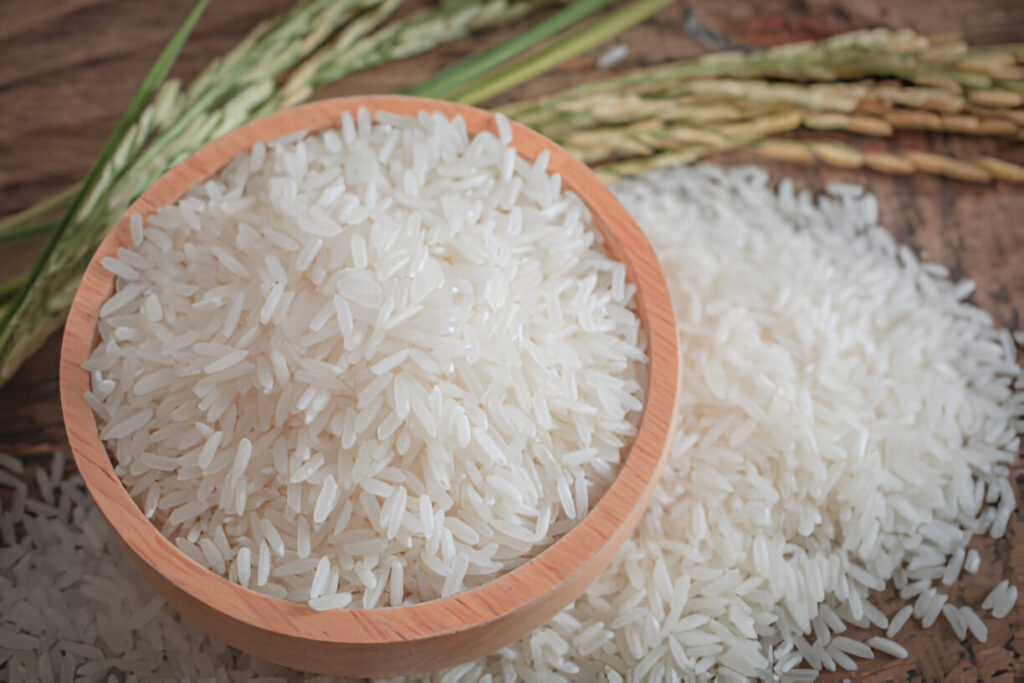
1. Rich in Essential Nutrients
Vitamins for Health
When it comes to basmati rice nutrition, one of the most important aspects is its vitamin content. Basmati rice is an excellent source of B vitamins, particularly B1 (thiamine) and B3 (niacin). These vitamins are essential for the body’s energy production and help maintain healthy nerve function.
Vitamin B1 plays a key role in converting food into energy, while vitamin B3 supports the metabolism of carbohydrates, fats, and proteins. These vitamins are crucial for optimal health, and basmati rice provides a natural, easily digestible source.
Additionally, basmati rice contains small amounts of vitamin B6, which supports brain health and the formation of red blood cells. Vitamin B6 also helps synthesize neurotransmitters, including serotonin and norepinephrine, which regulate mood and stress levels. With these B vitamins, basmati rice nutrition contributes to a balanced and healthy diet.
Minerals for Vitality
Basmati rice nutrition also offers a variety of essential minerals that support the body’s vital functions. Iron is a notable mineral found in basmati rice, and it transports oxygen throughout the body.
Adequate iron intake is crucial for maintaining energy levels and preventing anemia. While the iron content in basmati rice is not as high as in other food sources, it still contributes to meeting the body’s daily iron needs.
Another essential mineral in basmati rice is magnesium, which supports muscle and nerve function, regulates blood sugar levels, and contributes to bone health. Magnesium also plays a role in the synthesis of protein and the production of energy.
Consuming basmati rice regularly supports the body’s magnesium requirements, ensuring these essential functions remain optimized.
Basmati rice also contains small amounts of potassium and phosphorus. Potassium is crucial for regulating fluid balance and maintaining healthy blood pressure levels, while phosphorus supports the formation of bones and teeth and helps produce energy.
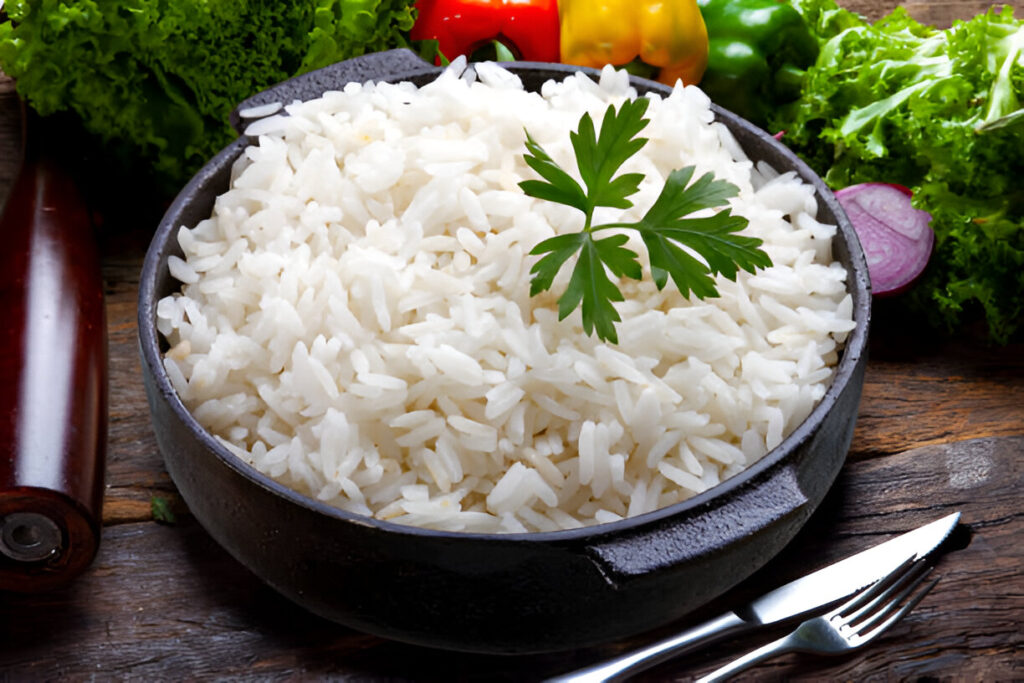
Antioxidants for Protection
A standout feature of basmati rice nutrition is its antioxidant content. Antioxidants protect the body from oxidative stress caused by free radicals linked to various chronic diseases, including heart disease, diabetes, and cancer.
Basmati rice contains several antioxidants, including phenolic compounds, which have been shown to reduce inflammation and protect cells from damage.
One of the most prominent antioxidants in basmati rice is the compound known as anthocyanin, which gives the rice its characteristic color in some varieties, such as black basmati. Anthocyanins have been shown to have anti-inflammatory and antioxidant properties, which can help reduce the risk of chronic diseases.
These compounds also support overall cellular health, ensuring the body functions optimally and protects against harmful environmental factors.
In addition to anthocyanins, basmati rice contains flavonoids, another group of antioxidants that help neutralize free radicals and protect the body from oxidative damage. You can enjoy its antioxidant benefits and support long-term health by including basmati rice in your diet.
Complex Carbohydrates for Energy
One of the key nutritional benefits of basmati rice is its high carbohydrate content, which provides the body with a steady and reliable energy source. Unlike simple carbohydrates, which cause rapid spikes and crashes in blood sugar levels, the carbohydrates in basmati rice are complex, meaning they are digested more slowly.
This slow digestion ensures that energy is released gradually throughout the day, helping to maintain stable blood sugar levels and providing sustained energy for daily activities.
The complex carbohydrates in basmati rice also promote satiety and prevent overeating. Because basmati rice is digested slowly, it helps you feel complete for extended periods, aiding in weight management.
This makes it an excellent choice for those looking to maintain a balanced diet without experiencing hunger pangs between meals.
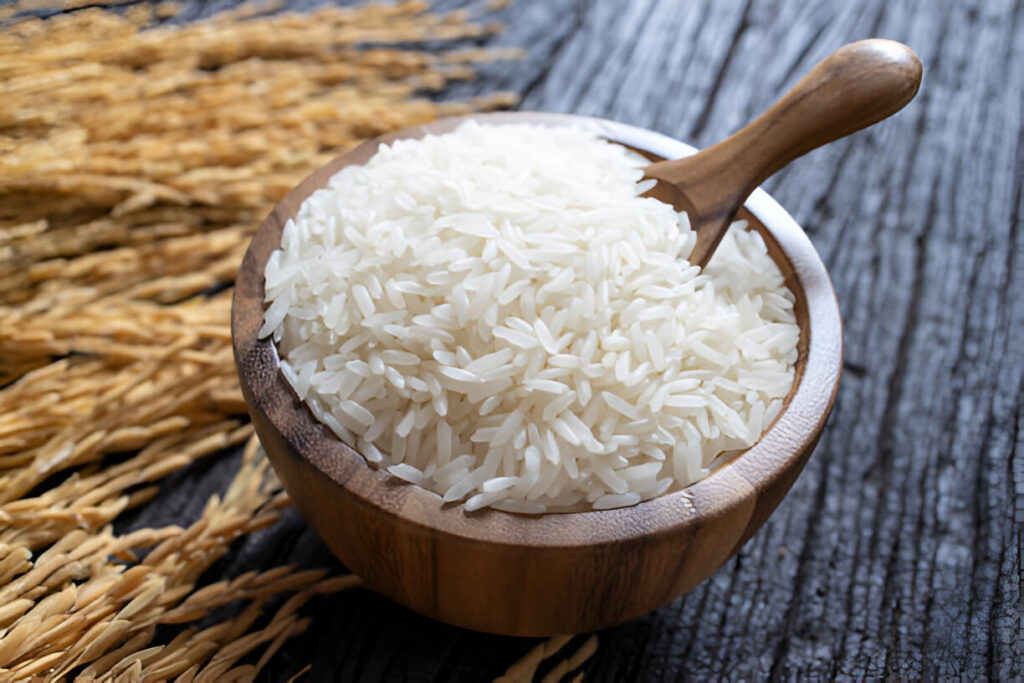
Additionally, the fiber content in basmati rice contributes to digestive health, helping to regulate bowel movements and prevent constipation. Fiber also supports the growth of healthy gut bacteria, which is essential for nutrient absorption and overall gut health.
Combining complex carbohydrates and fiber makes basmati rice excellent for sustaining energy levels and promoting digestive wellness.
Low Glycemic Index
Basmati rice is known for having a lower glycemic index (GI) than other rice types. The glycemic index measures how quickly a food raises blood sugar levels. Foods with a high GI cause rapid spikes in blood sugar, while foods with a low GI release sugar more slowly into the bloodstream.
This slower release of glucose helps maintain stable energy levels and prevents insulin spikes, making basmati rice a better option for individuals looking to manage their blood sugar.
Basmati rice’s lower GI makes it ideal for individuals with diabetes or those trying to prevent blood sugar fluctuations. Its slow digestion also helps regulate appetite and prevent overeating, making it a great option for those seeking to maintain a healthy weight.
Gluten Free Option
Basmati rice is naturally gluten free, making it an excellent food choice for individuals with gluten sensitivity or celiac disease. Many gluten free diets rely on grains like rice to provide essential nutrients without the risk of gluten related reactions. Basmati rice offers a safe and nutritious alternative to gluten containing grains while delivering essential vitamins, minerals, and carbohydrates.
For those following a gluten free diet, basmati rice can be a versatile base for various dishes, from stir fries to salads to curries. Its delicate texture and aromatic flavor make it a popular choice in many cuisines worldwide.
2. Supports Digestive Health
Rich in Dietary Fiber
One of the primary ways basmati rice supports digestive health is through its fiber content. Fiber is an essential component of a healthy diet that helps to regulate bowel movements and prevent constipation. Basmati rice contains significant amounts of soluble and insoluble fiber, particularly the whole grain variety.
This fiber adds bulk to stool and improves its passage through the intestines, thus preventing common digestive problems like constipation and bloating. The fiber in basmati rice also supports healthy gut bacteria, which plays a key role in the proper functioning of the digestive system.
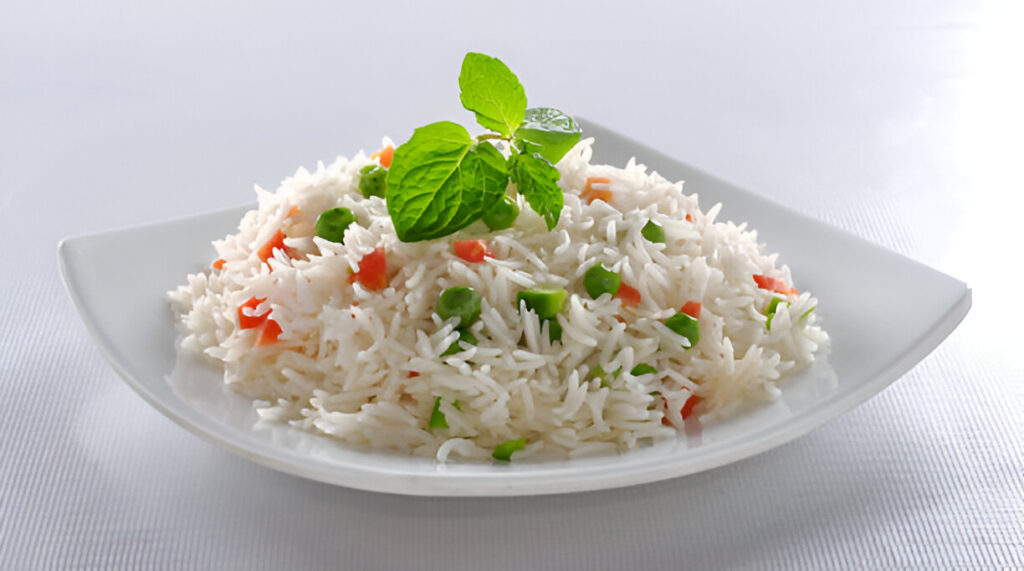
Incorporating fiber-rich foods such as basmati rice into the diet helps maintain regular bowel movements and reduces the likelihood of developing digestive disorders. Fiber helps regulate the amount of water in the stool, ensuring that it remains soft and easy to pass. Basmati rice aids in improving overall gut health and preventing discomfort by preventing constipation.
Easily Digestible for Sensitive Stomachs
Unlike many other rice or grains, basmati rice is easy on the stomach, making it an ideal choice for people with sensitive digestive systems. Its high digestibility is particularly beneficial for those recovering from digestive illnesses or surgeries.
Compared to other rice varieties, basmati rice has a lower starch content, which results in a lighter, more easily digestible texture. This means that the body absorbs it more efficiently, minimizing the risk of indigestion or bloating.
For individuals with conditions like irritable bowel syndrome (IBS) or gastritis, basmati rice provides a gentle and soothing option for adding carbohydrates to the diet without irritating the stomach.
Its gentle nature on the digestive tract makes it a safe and comfortable choice for those looking to improve their digestion without the risk of discomfort or flare-ups.
Promotes Healthy Gut Flora
Gut health is essential to the digestive process, and basmati rice plays a role in maintaining a balanced gut microbiome. The fiber in basmati rice acts as a prebiotic, which is a substance that stimulates the growth of beneficial bacteria in the gut.
Prebiotics help foster a healthy balance of good bacteria, essential for proper digestion, nutrient absorption, and overall immune function.
A healthy gut microbiome is vital for breaking down food, synthesizing vitamins, and supporting immune health. By including basmati rice in your diet, you provide a source of prebiotics that can help encourage the growth of these beneficial microorganisms.
This leads to improved digestive health and a more muscular immune system, as a well-balanced gut microbiome is essential for fighting infections and maintaining overall well-being.
Reduces Digestive Discomfort
Basmati rice is a gentle food for those who experience digestive discomfort. Its light texture and ease of digestion make it a go-to option for individuals with digestive issues like acid reflux, heartburn, or bloating.
Unlike heavier grains that might cause discomfort, basmati rice is mild on the stomach, reducing the likelihood of irritation or gas buildup. It is an excellent food for those who need a simple, easy-to-digest meal that doesn’t exacerbate gastrointestinal problems.
For people suffering from gastrointestinal conditions, consuming basmati rice can offer relief by providing a low acid, non irritating food source. It helps soothe the stomach lining and can prevent the uncomfortable sensations that come with eating foods that are too rich or spicy.
Its soothing properties make basmati rice a valuable addition to a digestive friendly diet, helping reduce digestive discomfort and promoting comfort after meals.
Balances Stomach Acidity
Basmati rice balances stomach acidity, which is essential for people who suffer from acid reflux or gastritis. Its mild nature helps absorb excess stomach acid, preventing it from backing up into the esophagus and causing discomfort.
Unlike acidic foods that may irritate the stomach lining, basmati rice has an alkaline effect, which can soothe and balance stomach acidity.
Incorporating basmati rice into a diet aimed at controlling stomach acid helps maintain a more stable pH in the stomach, reducing the risk of acid reflux and other related digestive disorders.
This makes it a valuable food for individuals seeking to manage conditions like GERD (gastroesophageal reflux disease) or acid reflux.
Its neutralizing properties support digestion without adding to the stomach’s acidity, contributing to better overall digestive health.

Improves Digestive Enzyme Function
Basmati rice also aids in the proper functioning of digestive enzymes. Digestive enzymes are proteins that help break down food into smaller, absorbable components. For the body to effectively digest food and absorb nutrients, these enzymes must work optimally.
The carbohydrates in basmati rice are quickly broken down by digestive enzymes, providing an efficient energy source without taxing the digestive system. This allows the body to focus on absorbing nutrients while minimizing the burden on digestive enzymes.
Furthermore, basmati rice is naturally low in fat, which can help reduce the workload on digestive enzymes responsible for breaking down fats. The body can better regulate enzyme activity by eating basmati rice, ensuring a smooth digestion process.
This contributes to the efficient breakdown of food and optimal nutrient absorption, further enhancing digestive health.
3. Boosts Energy and Metabolism
Complex Carbohydrates for Sustained Energy
The primary source of energy in basmati rice comes from its carbohydrates. Unlike simple sugars, which can cause rapid spikes and crashes in blood sugar levels, basmati rice contains complex carbohydrates that are digested more slowly by the body.
This slow digestion ensures that energy is released gradually, providing a steady fuel supply over an extended period. As a result, basmati rice is an excellent food for maintaining consistent energy throughout the day, preventing the energy dips that can occur after consuming high-glycemic foods.
The carbohydrates in basmati rice provide the body with glucose, which the muscles and brain use for energy. For individuals with active lifestyles or those needing a quick energy boost, basmati rice offers a perfect solution, replenishing glycogen stores and helping fuel the body’s natural processes.
Whether tackling a busy workday, hitting the gym, or engaging in any physically demanding activity, basmati rice can provide the consistent energy needed to perform at your best.
Supports Healthy Metabolism
Basmati rice also supports a healthy metabolism. Metabolism is the process by which the body converts food into energy, and it is essential for maintaining healthy body functions.
A well-functioning metabolism ensures that the body efficiently uses calories, preventing excess fat storage and promoting a healthy weight.
The fiber and nutrients in basmati rice contribute to metabolic processes, helping regulate blood sugar levels and improving overall metabolic efficiency.
The B vitamins present in basmati rice, particularly B1 (thiamine) and B3 (niacin) are vital for metabolic function. These vitamins convert carbohydrates, fats, and proteins into energy, ensuring that the body can efficiently process the food we eat.
By providing these key nutrients, basmati rice helps maintain an active metabolism, promoting the breakdown of food into usable energy and preventing sluggishness or fatigue.
Low Glycemic Index for Steady Energy
One of the reasons basmati rice is so effective at boosting energy and metabolism is its low glycemic index (GI). The glycemic index measures how quickly a food raises blood sugar levels after consumption.
Foods with a high GI cause rapid spikes in blood sugar, followed by crashes that can lead to feelings of fatigue and irritability. On the other hand, Basmati rice has a low GI, meaning it is digested and absorbed more slowly, resulting in a gradual increase in blood sugar levels.
The slow, steady release of glucose from basmati rice provides the body with consistent energy without causing blood sugar spikes or crashes. This constant flow of energy supports physical and mental endurance, helping to keep you alert and active throughout the day.
For individuals with conditions like diabetes, choosing low-GI foods such as basmati rice can help regulate blood sugar levels and improve metabolic control.
Rich in Nutrients for Energy Production
In addition to carbohydrates, basmati rice is rich in several key nutrients that support energy production. It contains essential B vitamins, such as thiamine, niacin, and B6, which are crucial in converting food into energy.
These vitamins help the body metabolize carbohydrates, fats, and proteins, ensuring that the energy from food is efficiently utilized. By consuming basmati rice, you give your body the nutrients it needs to generate and sustain energy throughout the day.
Basmati rice is also a good source of iron, a mineral essential for oxygen transport in the body. Iron is a key component of hemoglobin, which carries oxygen to tissues and organs in the blood. Without enough iron, the body can experience fatigue and reduced physical performance.
By incorporating basmati rice into your diet, you ensure that your body has access to this vital mineral, helping to maintain energy levels and prevent tiredness or weakness.
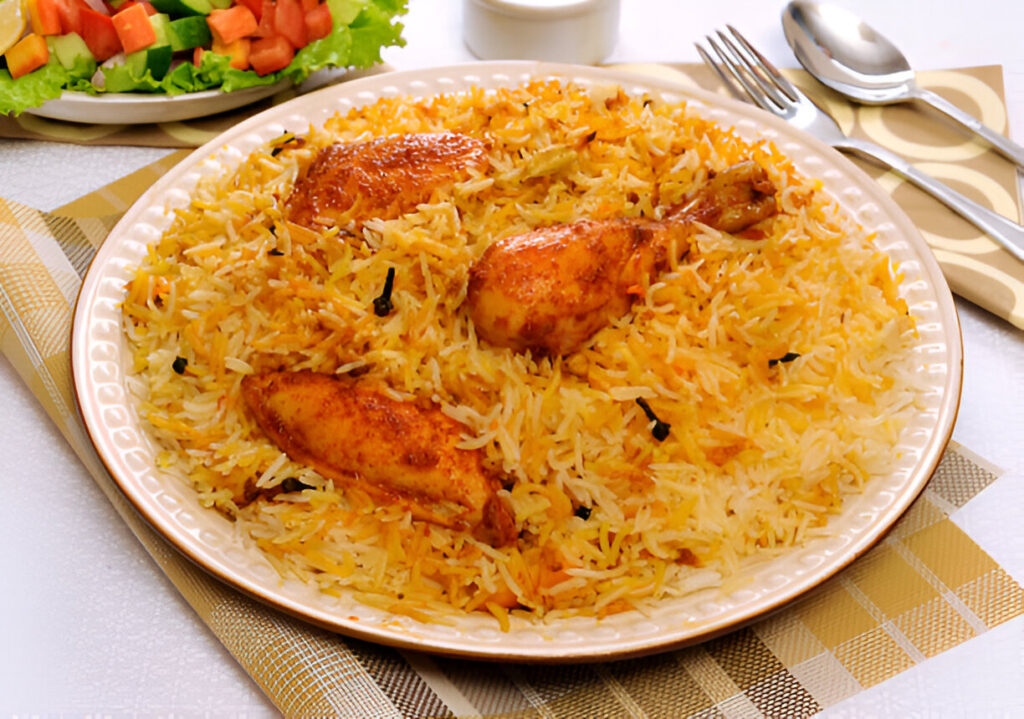
Ideal for Active Lifestyles
For individuals who lead an active lifestyle, whether through exercise or busy daily routines, basmati rice is an excellent energy source. As a high carbohydrate food, it replenishes glycogen stores in muscles and provides the body with the fuel it needs to power through physical activity.
Whether running, cycling, lifting weights, or participating in sports, basmati rice provides the necessary carbohydrates to energize your muscles and function at their best.
Athletes and fitness enthusiasts often turn to basmati rice because it helps replenish muscle energy after workouts, aiding recovery and preventing fatigue. Its digestibility and gentle impact on the stomach also make it a preferred choice for athletes who need a quick, easily absorbed energy source that won’t weigh them down.
Promotes Fat Metabolism
Basmati rice’s role in promoting healthy metabolism extends beyond carbohydrate digestion. It also plays a role in fat metabolism, helping the body process fats more efficiently. When combined with a balanced diet and regular physical activity, basmati rice can help prevent excess fat storage by ensuring that the body uses fat for energy when needed.
The fiber content in basmati rice also supports fat digestion, promoting the breakdown of fats and helping to regulate cholesterol levels.
Combining complex carbohydrates and fiber, basmati rice is ideal for individuals looking to maintain a healthy weight. It helps curb hunger and prevent overeating, allowing the body to rely on stored fat for energy during physical exertion.
As a result, basmati rice contributes to healthy fat metabolism, supporting weight management and overall energy balance.
Brown Basmati Rice nutrition
The whole grain basmati rice, known as brown basmati rice, provides a richer source of fiber and a more balanced proportion of nutrition due to the inclusiveness of the bran and germ.
1 cup (roughly 195 grams) of cooked brown basmati rice has about:
- Calories: 215-220
- Carbohydrates: 45-46 grams
- Protein: 5 grams
- Fat: 1.5 grams
- Fiber: 3.5-4 grams
- Vitamins & minerals: A good source of B vitamins (notably B6), iron, magnesium, phosphorus, and zinc
Due to its lower glucose score than white rice, brown basmati rice is a superior option for blood sugar management and digestive health.
Conclusion
Basmati rice is a powerhouse of energy and metabolism support. Its complex carbohydrates provide a steady supply of glucose to fuel the body, while its low glycemic index ensures that energy is released gradually for sustained activity.
Rich in essential nutrients like B vitamins and iron, basmati rice helps support energy production, muscle function, and overall metabolic health. Its digestibility and ability to replenish glycogen stores make it an ideal food for athletes and individuals with active lifestyles.
Whether you’re looking to boost your energy levels during the day or enhance your metabolism for better health, basmati rice is an excellent choice. By incorporating this nutrient rich food into your diet, you can ensure a steady supply of energy, support metabolic function, and improve overall well being.
<script type="application/ld+json">
{
"@context": "https://schema.org",
"@type": "Article",
"mainEntityOfPage": {
"@type": "WebPage",
"@id": "https://skyhealthnews.com/basmati-rice-nutrition/"
},
"headline": "Basmati Rice Nutrition",
"description": "Basmati rice nutrition is an aromatic, long-grain rice variety with several health benefits.",
"image": "https://skyhealthnews.com/wp-content/uploads/2025/01/Basmati-Rice-Nutrition-2-1024x683.jpg",
"author": {
"@type": "Person",
"name": "Farhad",
"url": "https://skyhealthnews.com/author/farhad"
},
"publisher": {
"@type": "Organization",
"name": "",
"logo": {
"@type": "ImageObject",
"url": ""
}
},
"datePublished": "2025-01-31"
}
</script>